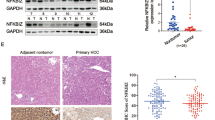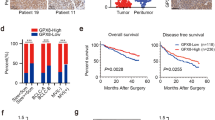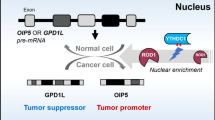Abstract
Dbl-family guanine nucleotide exchange factors (GEFs) can activate RhoGTPases by facilitating the exchange of GDP for GTP, the aberrant expression of which has been implicated in tumorigenicity and metastasis of human cancers. ARHGEF39, as a member of Dbl-family GEFs, was reported to be a potential oncogene in human hepatocellular carcinoma previously. However, the role of ARHGEF39 in gastric cancer (GC) remains unclear so far. In the current study, we demonstrated that ARHGEF39 expression was significantly upregulated in GC tissues compared with paired adjacent normal tissues by quantitative real-time PCR analysis. Functional analyses revealed that ARHGEF39 overexpression could promote proliferation, colony formation, and migration of GC cells in vitro, whereas ARHGEF39 knockdown markedly suppressed these phenotypes. Moreover, ARHGEF39 enhanced tumorigenicity and lung metastasis potential of GC cells in nude mice model. Mechanistically, we found that overexpressed ARHGEF39 significantly increased the phosphorylation level of Akt (p-Akt), and its effect on cell proliferation was attenuated by PI3K inhibitor LY294002. Thus, our findings suggest that ARHGEF39 may contribute to cell proliferation and migration in GC via a possible mechanism involving Akt signaling.






Similar content being viewed by others
References
Jemal A, Bray F, Center MM, Ferlay J, Ward E, Forman D (2011) Global cancer statistics. CA Cancer J Clin 61:69–90. doi:10.3322/caac.20107
Ferro A, Peleteiro B, Malvezzi M, Bosetti C, Bertuccio P, Levi F, Negri E, La Vecchia C, Lunet N (2014) Worldwide trends in gastric cancer mortality (1980–2011), with predictions to 2015, and incidence by subtype. Eur J Cancer 50:1330–1344. doi:10.1016/j.ejca.2014.01.029
De Angelis R, Sant M, Coleman MP, Francisci S, Baili P, Pierannunzio D, Trama A, Visser O, Brenner H, Ardanaz E, Bielska-Lasota M, Engholm G, Nennecke A, Siesling S, Berrino F, Capocaccia R, Group E-W (2014) Cancer survival in Europe 1999–2007 by country and age: results of EUROCARE-5-a population-based study. Lancet Oncol 15:23–34. doi:10.1016/S1470-2045(13)70546-1
Zhao J, Liu Y, Huang G, Cui P, Zhang W, Zhang Y (2015) Long non-coding RNAs in gastric cancer: versatile mechanisms and potential for clinical translation. Am J Cancer Res 5:907–927
Karlsson R, Pedersen ED, Wang Z, Brakebusch C (2009) Rho GTPase function in tumorigenesis. Biochim Biophys Acta 1796:91–98. doi:10.1016/j.bbcan.2009.03.003
Van Aelst L, D’Souza-Schorey C (1997) Rho GTPases and signaling networks. Genes Dev 11:2295–2322
Bishop AL, Hall A (2000) Rho GTPases and their effector proteins. Biochem J 348(Pt 2):241–255
Jaffe AB, Hall A (2005) Rho GTPases: biochemistry and biology. Annu Rev Cell Dev Biol 21:247–269. doi:10.1146/annurev.cellbio.21.020604.150721
Whitehead IP, Campbell S, Rossman KL, Der CJ (1997) Dbl family proteins. Biochim Biophys Acta 1332:F1–F23
Hart MJ, Eva A, Zangrilli D, Aaronson SA, Evans T, Cerione RA, Zheng Y (1994) Cellular transformation and guanine nucleotide exchange activity are catalyzed by a common domain on the dbl oncogene product. J Biol Chem 269:62–65
Baumeister MA, Rossman KL, Sondek J, Lemmon MA (2006) The Dbs PH domain contributes independently to membrane targeting and regulation of guanine nucleotide-exchange activity. Biochem J 400:563–572. doi:10.1042/BJ20061020
Fernandez-Zapico ME, Gonzalez-Paz NC, Weiss E, Savoy DN, Molina JR, Fonseca R, Smyrk TC, Chari ST, Urrutia R, Billadeau DD (2005) Ectopic expression of VAV1 reveals an unexpected role in pancreatic cancer tumorigenesis. Cancer Cell 7:39–49. doi:10.1016/j.ccr.2004.11.024
Citterio C, Menacho-Marquez M, Garcia-Escudero R, Larive RM, Barreiro O, Sanchez-Madrid F, Paramio JM, Bustelo XR (2012) The rho exchange factors vav2 and vav3 control a lung metastasis-specific transcriptional program in breast cancer cells. Sci Signal 5:ra71. doi:10.1126/scisignal.2002962
Wang H, Li Y, Wang Y, Han ZG, Cai B (2012) C9orf100, a new member of the Dbl-family guanine nucleotide exchange factors, promotes cell proliferation and migration in hepatocellular carcinoma. Mol Med Rep 5:1169–1174. doi:10.3892/mmr.2012.783
Rossman KL, Der CJ, Sondek J (2005) GEF means go: turning on RHO GTPases with guanine nucleotide-exchange factors. Nat Rev Mol Cell Biol 6:167–180. doi:10.1038/nrm1587
Porta C, Paglino C, Mosca A (2014) Targeting PI3K/Akt/mTOR Signaling in Cancer. Front Oncol 4:64. doi:10.3389/fonc.2014.00064
McKay MM, Morrison DK (2007) Integrating signals from RTKs to ERK/MAPK. Oncogene 26:3113–3121. doi:10.1038/sj.onc.1210394
Bang YJ, Kim YW, Yang HK, Chung HC, Park YK, Lee KH, Lee KW, Kim YH, Noh SI, Cho JY, Mok YJ, Kim YH, Ji J, Yeh TS, Button P, Sirzen F, Noh SH, investigators Ct (2012) Adjuvant capecitabine and oxaliplatin for gastric cancer after D2 gastrectomy (CLASSIC): a phase 3 open-label, randomised controlled trial. Lancet 379:315–321. doi:10.1016/S0140-6736(11)61873-4
Sakuramoto S, Sasako M, Yamaguchi T, Kinoshita T, Fujii M, Nashimoto A, Furukawa H, Nakajima T, Ohashi Y, Imamura H, Higashino M, Yamamura Y, Kurita A, Arai K (2007) Adjuvant chemotherapy for gastric cancer with S-1, an oral fluoropyrimidine. N Engl J Med 357:1810–1820. doi:10.1056/NEJMoa072252
Sasako M, Sakuramoto S, Katai H, Kinoshita T, Furukawa H, Yamaguchi T, Nashimoto A, Fujii M, Nakajima T, Ohashi Y (2011) Five-year outcomes of a randomized phase III trial comparing adjuvant chemotherapy with S-1 versus surgery alone in stage II or III gastric cancer. J Clin Oncol 29:4387–4393. doi:10.1200/JCO.2011.36.5908
Xia P, Xu XY (2015) PI3K/Akt/mTOR signaling pathway in cancer stem cells: from basic research to clinical application. Am J Cancer Res 5:1602–1609
Acknowledgements
This work was supported by the National Natural Science Foundation of China (No. 81302490).
Author information
Authors and Affiliations
Corresponding authors
Ethics declarations
Conflict of interest
The authors declare that they have no conflict of interest.
Rights and permissions
About this article
Cite this article
Wang, H., Li, M., Tao, X. et al. ARHGEF39 promotes gastric cancer cell proliferation and migration via Akt signaling pathway. Mol Cell Biochem 440, 33–42 (2018). https://doi.org/10.1007/s11010-017-3153-3
Received:
Accepted:
Published:
Issue Date:
DOI: https://doi.org/10.1007/s11010-017-3153-3




